
To sell or not to sell. That is the question at the heart of the Pulitzer Prize-winning August Wilson’s The Piano Lesson, an October gift from A Noise Within to the playwright’s many fans, and even for those like this reviewer who’d prefer it if Wilson’s Pittsburgh Cycle decalogy didn’t run a hefty three hours each, this is easily one of his most entertaining and powerful works.
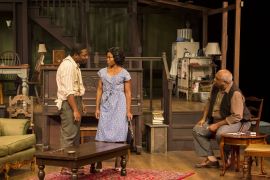 The item for sale (or not for sale depending on whom you ask) is the titular upright, a family heirloom that pits 35-year-old Berniece (Nija Okoro) against her younger brother Willie Boy (Kai A. Ealy), who’s shown up on her Pittsburgh doorstep in the year 1936 vowing not to return south to Mississippi without sale profits in hand, cash with which he intends to purchase the land which his forbears tilled for slave owner Sutter.
The item for sale (or not for sale depending on whom you ask) is the titular upright, a family heirloom that pits 35-year-old Berniece (Nija Okoro) against her younger brother Willie Boy (Kai A. Ealy), who’s shown up on her Pittsburgh doorstep in the year 1936 vowing not to return south to Mississippi without sale profits in hand, cash with which he intends to purchase the land which his forbears tilled for slave owner Sutter.
Such plans are, however, more easily proposed than achieved given Berniece’s insistence that the family piano, one onto which her ancestors’ likenesses have been carved, remain where it is, no matter that she hasn’t played a note on it since her mother’s death.
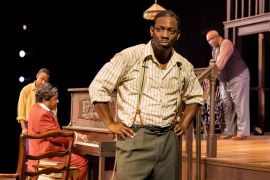 To Willie Boy, the piano represents the kind of future only land ownership can bring. To Berniece, it must remain both a link to a painful past and a lasting tribute to those who suffered through it.
To Willie Boy, the piano represents the kind of future only land ownership can bring. To Berniece, it must remain both a link to a painful past and a lasting tribute to those who suffered through it.
Wilson’s cast of supporting characters is, as always, a colorful one, beginning with Doaker (Alex Morris), who shares his niece Berniece’s Pittsburgh digs with her nearly-teenage daughter Maretha (Madison Keffer) and does his best to remain neutral in the sibling feud.
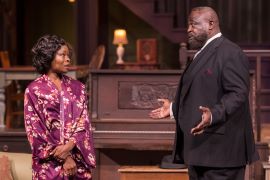 There’s also preacher Avery Brown (Jernard Burks), who’s been doing his best to woo Berniece since the untimely death of her husband Crawley; Boy Willie’s bosom buddy Lymon (Evan Lewis Smith), who’s accompanied his bff on his trip up north and quickly finds himself attracted to Boy Willie’s comely sister; Wining Boy (Gerald C. Rivers), whose frequent visits to Berniece’s place coincide not so coincidentally with his frequent bankruptcies; and the voluptuous Grace (LeShay Tomlinson Boyce), who pops in late in the show on a drunk and horny Boy Willie’s arm.
There’s also preacher Avery Brown (Jernard Burks), who’s been doing his best to woo Berniece since the untimely death of her husband Crawley; Boy Willie’s bosom buddy Lymon (Evan Lewis Smith), who’s accompanied his bff on his trip up north and quickly finds himself attracted to Boy Willie’s comely sister; Wining Boy (Gerald C. Rivers), whose frequent visits to Berniece’s place coincide not so coincidentally with his frequent bankruptcies; and the voluptuous Grace (LeShay Tomlinson Boyce), who pops in late in the show on a drunk and horny Boy Willie’s arm.
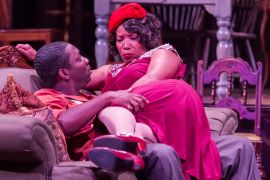 All of the above add up to a play which may not be any shorter than any of Wilson’s 10 Pittsburgh plays, but is considerably more entertaining, i.e. often laugh-out-loud funny, than say Seven Guitars, which tried my powers of concentration back in 2021 and featured too many of what a New York Times article described as “magically ungrounded detours.”
All of the above add up to a play which may not be any shorter than any of Wilson’s 10 Pittsburgh plays, but is considerably more entertaining, i.e. often laugh-out-loud funny, than say Seven Guitars, which tried my powers of concentration back in 2021 and featured too many of what a New York Times article described as “magically ungrounded detours.”
That’s not to say there aren’t elements of the supernatural in The Piano Lesson, chiefly the ghost of slave owner Sutter who makes his presence known in several just-in-time-for-Halloween haunted house sequences that are appropriately unsettling.
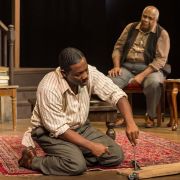 On a far deeper note, The Piano Lesson examines the consequences of the Northern migration made by Southern Blacks in the early 20th century, and the decisions made by those like Boy Willie to stick around and forge land-owning futures in the Southern states of their birth.
On a far deeper note, The Piano Lesson examines the consequences of the Northern migration made by Southern Blacks in the early 20th century, and the decisions made by those like Boy Willie to stick around and forge land-owning futures in the Southern states of their birth.
All of this adds up to powerful, elucidating, talk-generating stuff under Gregg T, Daniel’s incisive direction in a production anchored by three dynamic star turns and five topnotch supporting performances.
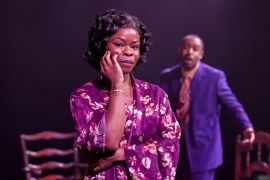 A stunning Okoro gives Berniece equal parts strength, determination, and vulnerability; Ealy is never less than commanding as the brash, impulsive Boy Willie; and Morris is a force to be reckoned with as a man just trying to keep the peace in a fractured family.
A stunning Okoro gives Berniece equal parts strength, determination, and vulnerability; Ealy is never less than commanding as the brash, impulsive Boy Willie; and Morris is a force to be reckoned with as a man just trying to keep the peace in a fractured family.
Smith’s downright charming Lymon, Rivers’ flashy, loquacious Wining Boy, Burks’ impassioned Avery, and Keffer’s lovely Maretha provide pitch-perfect support, and a fiery Boyce makes the most of Grace’s brief stage time.
 Tesshi Nakagawa’s multi-storied wood-framed house set is one of his best, particularly as lit to striking, occasionally otherworldly effect by Brandon Baruch and backed by sound designer Jeff Gardner’s blues-infused underscoring and some scary effects.
Tesshi Nakagawa’s multi-storied wood-framed house set is one of his best, particularly as lit to striking, occasionally otherworldly effect by Brandon Baruch and backed by sound designer Jeff Gardner’s blues-infused underscoring and some scary effects.
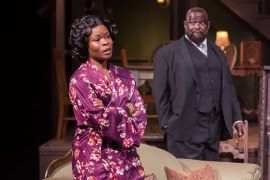 Alethia Moore-Del Monaco’s 1930s costumes snd Shelia Dorn’s wigs and makeup evoke the era to perfection in a production design completed by Stephen Taylor’s just-right props.
Alethia Moore-Del Monaco’s 1930s costumes snd Shelia Dorn’s wigs and makeup evoke the era to perfection in a production design completed by Stephen Taylor’s just-right props.
Last but not least, The Piano lesson features Joyce Guy’s choreography, Kenneth R. Merckx, Jr.’s fight choreography, and music direction by Maritri Garrett, who elicits showstopping vocals in the play’s several song sequences.
Bernard K. Addison, Brent Charles, Kwayi Grimstad Ndjamen, Asim Rashad, Kalyn Rivers, Levy Lee Simon,ReSheda D. Terry, and Ephraim Williams are understudies.
Marques Green is assistant director. Malick Ceesay is assistant sound designer. Sasha Smith is intimacy coordinator, Andrea Odinov is dialect coach, and Miranda Johnson-Haddad is dramaturg. Lanae Wilks is stage manager and Bryan Tiglio is assistant stage manager. Lucy Pollak is publicist.
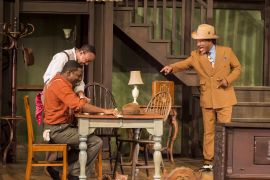 August Wilson plays have always been a bit of a mixed bag for me. Some, like Fences and Radio Golf have grabbed me from start to finish, while others have tried my attention span.
August Wilson plays have always been a bit of a mixed bag for me. Some, like Fences and Radio Golf have grabbed me from start to finish, while others have tried my attention span.
August Wilson’s The Piano Lesson ranks somewhere in the top middle of his decalogy. While I can’t help wishing cuts had been made (though perhaps not as many as in the 1995 TV movie adaptation that clocked in at 95 minutes), even at three hours long, it is powerful, moving, and unexpectedly entertaining stuff.
A Noise Within, 3352 East Foothill Blvd, Pasadena.
www.anoisewithin.org
–Steven Stanley
October 19, 2024
Photos: Craig Schwartz
Tags: A Noise Within, August Wilson, Los Angeles Theater Review


 Since 2007, Steven Stanley's StageSceneLA.com has spotlighted the best in Southern California theater via reviews, interviews, and its annual StageSceneLA Scenies.
Since 2007, Steven Stanley's StageSceneLA.com has spotlighted the best in Southern California theater via reviews, interviews, and its annual StageSceneLA Scenies.







 COPYRIGHT 2025 STEVEN STANLEY :: DESIGN BY
COPYRIGHT 2025 STEVEN STANLEY :: DESIGN BY